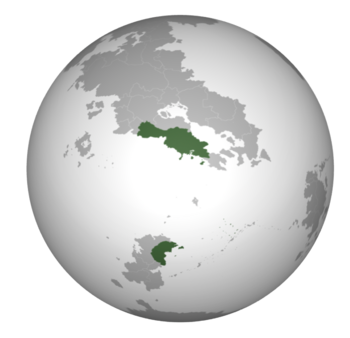Walakee State
The Walakee State was the corporatist and authoritarian regime that ruled Tierrador from the Qabóri coup d'etat in 1911 to the Ten Cities Uprising and the Woqelee Reinstatement in 1989. The House of Walakee, the ruling dynasty of this state, reigned the nation for most of the 20th century, despite not being comprised fully of relatives. The Walakee State evolved from the destabilizing Qabóri Woqalate following the Annexation of Auqali & Sonaxa in 1911. Following the Qabóri coup d'etat in 1911, the corporatist state was officially renamed to the Qabóri Commonwealth and was recognized as the successor state to the Woqalate. After Pedro Kintón took over as the Grand Woqali, the state eventually would become known the Democratic Republic of Tierrador in 1951, inspired greatly by the anti-industrialization movements which took place throughout the nation at the time, and the preservation of South Cronan culture in a rapidly-Occidentalizing world.
United Qabóri Commonwealths (1911–1951) Uniólaíta Qométet Qabór Democratic Republic of Tierrador (1951–1989) Republíq Democratóc le Terranóq | |||||||||
|---|---|---|---|---|---|---|---|---|---|
| 1911–1989 | |||||||||
Motto: Diuš, Tailoc a Qukolal ("God, Fatherland, and Family") | |||||||||
Anthem: Tierradorian March (1911–1989) | |||||||||
 Location of the greatest territorial extent of the Walakee State (dark green) | |||||||||
| Capital | Qabór (1911–1951) Suqovia (1951–1989) | ||||||||
| Official languages | Qabóri | ||||||||
| Common languages | Terra Ænglish Western Valley Qabóri | ||||||||
| Religion | Levantine Catholicism | ||||||||
| Demonym(s) | Qabóri (1911–1951) Tierradorian (1951–1989) | ||||||||
| Government | Unitary one-party corporatist parliamentary constitutional monarchy under an authoritarian dictatorship (1911–1951) Unitary corporatist parliamentary republic under an authoritarian dictatorship (1951–1989) | ||||||||
| Woqali | |||||||||
• 1911–1931 | Auno Sanleć | ||||||||
• 1931–1951 | Satola Sanleć | ||||||||
• 1951–1983 | Pedro Kintón | ||||||||
• 1983–1989 | Nathan Hauqač | ||||||||
| Qaphenć (1911-1989) | |||||||||
• 1911–1915 (first) | Taiyó Kikó | ||||||||
• 1987–1989 (last) | Daniel W. Šaphiana | ||||||||
| Legislature | Bicameral Qangreč (1911–1971) Unicameral Qangreč (1971–1989) | ||||||||
| History | |||||||||
• Qabóri Guard coup d'etat | 3 October 1911 | ||||||||
• Walakee State declared | 3 August 1911 | ||||||||
| 11 April 1989 | |||||||||
| 27 September 1989 | |||||||||
| |||||||||
The Walakee State, throughout its history, was greatly opposed to the ideologies of communism, socialism, syndicalism, anarchism, liberalism, industrialism, and occidentalization. The regime was heavily conservative, corporatist, and nationalist. Due to the large spikes in incarceration and police activity throughout its reign, the Walakee State was commonly dubbed as a police state. Its policy fully emphasized Tierrador as the dominant superpower in Crona, along with maintaining a sizable sphere of influence across South Crona. It also established itself as the supposed source of civilization and stability to the overseas societies in the smaller overseas possessions. Under the Walakee State, Tierrador perpetuated a vast, centuries-old empire with a total area of 5,074,979 square kilometers (1,959,460 sq mi), while other former imperialistic powers had, by this time, largely acceded to global calls for self-determination and independence of the lands that they subjugated. Pedro Kintón, who served as head of state for the majority of the regime's tenure, enhanced the imperialistic tendencies of Tierrador, with the anti-narcotic sentiment and the police state theory sparking the South Cronan Narco Wars, which lasted from 1959 to 1983.
Despite the largely anti-Occidental sentiment which was seen in both Walakee politics and society, the regime maintained fairly close ties with the Occident, being a full member of many Occidental-dominated organizations, such as the Levantia and Odenoru Treaty Association (LOTA) since its founding, the League of Nations since 1961, and going as far as fighting alongside Levantine powers in the Second Great War until 1941. Following the onset of the Occidental Cold War, the Walakee State maintained its relationship with LOTA, despite protests from anti-Occidental groups and fears of the Levantine Creep reaching Tierrador. The Walakee State was best known for the policies enacted under the administration of Kintón. Kintón paved the way towards economic integration with the rest of Crona and a higher level of economic liberalization in the country. From 1951 until Kintón's death in 1983, Tierrador saw a consistent GDP per capita increase at an annual average rate of 6.7 percent.
Tierrador under the Walakee State saw a massive increase in economic activity despite the heavy restrictions on industrialism. The regime emphasized Tierrador's status as a breadbasket in South Crona, enjoying being top-ranked consistently in agricultural exports. Following the Ten Cities Uprising in 1989, which saw mass riots, protests, and civil unrest in the ten largest cities in Tierrador to protest the authoritarian regime, the Walakee State under the more liberalized Nathan Hauqač would crumble. The Woqelee Reinstatement followed the mass rebellion, where the House of Walakee was formally deposed and replaced with the House of Woqelee. Many policies from the Walakee State remain in modern-day Tierrador.

